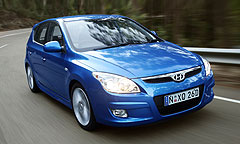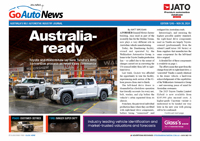Make / Model Search
News - HyundaiHyundai gets serious with diesel powerGenesis of an idea: Hyundai's big new saloon is the most likely recipient of a V8 diesel, but high fuel prices could scupper the engine. V8 diesel and high-efficiency technology also in South Korean skunkworks10 Jun 2008 HYUNDAI plans to cut fuel consumption of its diesel-powered models by up to 20 per cent and is also working on a potent V8 turbo-diesel for future luxury models. Visiting Australia last week to launch the diesel-powered Sonata, the head of Hyundai-Kia diesel development Se-Young Yi told GoAuto that his team was developing an eight-cylinder turbo-diesel engine. “It is a research project,” he said. “In the future if there is some demand for the V8 diesel (we will produce it), but it would be in a luxury vehicle.” The South Korean manufacturer currently builds a wide range of four-cylinder diesel engines, including the 1.6-litre four-cylinder that serves in the i30 in Australia and, in left-hand drive markets, a new 3.0-litre V6 diesel that powers the Veracruz SUV. The large Genesis sedan, which will be the first Hyundai to run a petrol V8 engine, would be a likely benefactor of the new V8 turbo-diesel, especially if Hyundai wants to improve its diesel credibility. Mr Yi said that Hyundai was currently evaluating the V8 diesel and admitted that soaring fuel prices could hamper its chances. At the same time, Mr Yi’s team is working to improve the efficiency of other diesel engines. “We are looking at new technologies and internal mechanical friction in the engine – this can give us 20 per cent improved fuel economies,” he said, adding that the company was concentrating on injection and compression-related gains to improve economy.  Left: Hyundai i30 CRDi. Left: Hyundai i30 CRDi.Mr Yi also said that the continuing advancement of petrol engines meant that they were becoming increasingly efficient and that diesels would need to continue advancing to keep their edge. “Engineers are forecasting that gasoline engines with technology improvements like variable valve actuation technology and direct injection will increase the economy of gasoline,” he said. “But there will be other countermeasures in diesel also in order for diesel to keep position in the market.” When asked if it would be harder to advance diesel technology than petrol, Mr Yi said “diesel is much harder than gasoline”. Hyundai is also continuing to develop hydrogen fuel cell technology and, as reported in GoAuto last November, is aiming to have the technology ready by 2012. That does not necessarily mean that Hyundai and its sister company Kia will release a vehicle at that stage. Asked when the first fuel cell models will go on sale, Hyundai-Kia senior research engineer Sungho Lee said that would depend on factors such as consumer demand, hydrogen infrastructure and government funding. “It is a very complicated question. It depends on the customer requirement and government policy the decision is made by them,” he said. “Still we have some issues, but we can produce mass production car in a few years.” Mr Lee said the cost of materials for the fuel cell stack was one of the factors that would need to be overcome. “Platinum is very expensive, but they are now reducing the amount of platinum in the fuel cell stack. We are also looking at other metal instead of platinum, which we expect will help us.” The other issue is the life of the fuel stack. Mr Lee said Hyundai-Kia’s current-generation fuel stack runs for 3000 hours without any degradation and that the company is aiming for 5000 hours. Read more:Hyundai flagship oils up |
Click to shareHyundai articlesResearch Hyundai Motor industry news |









Facebook Twitter Instagram